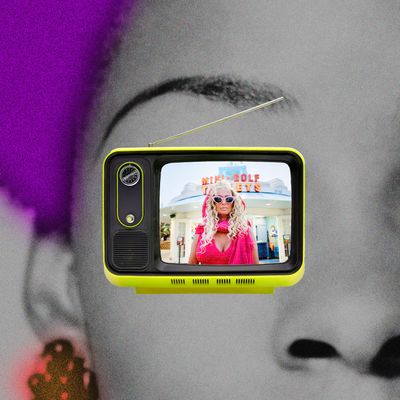
We get it: There’s an overwhelming number of television shows right now. The streaming landscape is an impractical maze, and the good stuff easily gets lost in the shuffle. But most of us can still find one show that cuts through the noise. We call this “appointment viewing” — or the time you carve out in your busy schedule to watch the show you’ll want to unpack the next day with your friends while it’s still on your mind. Tune in here each month to read what writer Michel Ghanem, a.k.a. @tvscholar, deems worthy of a group-chat deep dive.
So far this year, we’ve covered Emmy-nominated hits like Shōgun and True Detective, rooted for underrated gems like Big Mood and Interview With the Vampire, and even recommended our first reality dating show in a summer-TV roundup. This month, we can’t stop thinking about Chimp Crazy, a four-episode docuseries by Tiger King director Eric Goode following “Dolly Parton of chimps” Tania Haddix in her legal battle with PETA over keeping her chimpanzees.
What’s this chimp documentary I’ve been hearing about?
If you think raising a puppy is a lot of work, wait until you find out what it’s like caring for a chimpanzee. HBO’s latest docuseries, Chimp Crazy, follows Haddix, a nurse turned exotic-animal broker and the self-proclaimed Dolly Parton of chimps (she wears a lot of pink). Haddix began her chimp journey by volunteering at the Missouri Primate Foundation, a structure built by “chimp mom” Connie Braun that housed multiple grown chimpanzees. Upon finding out the caged enclosures were in less-than-stellar condition, the sometimes controversial animal-rights nonprofit People for the Ethical Treatment of Animals (PETA) came after the foundation in what would become a well-publicized feud.
In the midst of the legal battle, of which Haddix placed herself at the center, documentary filmmaker Eric Goode began filming both sides of the conflict, culminating in four episodes that primarily focus on Haddix and her eccentricities — sometimes empathizing with her deep connection for primates and at other times exposing her short-sightedness. The docuseries also contrasts Haddix’s case with other examples of chimp ownership in the United States that led to more violent conclusions (you may remember a disturbing 2009 Oprah interview on the subject).
Where can I watch it?
Chimp Crazy premieres on HBO on Sunday, August 18, with single episodes airing weekly until the finale on September 8. Documentaries are a sometimes overlooked strength in HBO’s programming. Critically acclaimed docuseries like The Jinx, The Vow, and The Crime of the Century have tackled everything from murderers to cults and big pharma. Some of my favorites are the quieter series, which are no less unflinching in telling specific stories but were not necessarily hits — like The Lady and the Dale, which weaved together animation and interviews to tell the story of Elizabeth Carmichael, a trans woman and fraudulent inventor with ideas ahead of her time (the series is produced by Mark and Jay Duplass). There was also Ren Faire, a Safdie brothers production directed by Lance Oppenheim, which followed the retirement of the self-proclaimed king of the renaissance faire in Texas.
That said, there’s nothing like a documentary that finds its creators wrapped up in the case itself, breaking the fourth wall of passive observation and opening itself up to scrutiny from the viewer on how the documentary is constructed to push a narrative in one particular direction — everything Nathan Fielder weaponized in his own docu-reality show for HBO, The Rehearsal, and nuances that come up in Chimp Crazy. And if you’ve got a hankering for more unique takes on the format, try HBO’s fictional adaptation of The Staircase, based on the Netflix docuseries of the same name.
So it’s about exotic animals, but is it anything like Tiger King?
Because of the massive success of Tiger King, Goode made the clever but ethically ambiguous decision to hire a proxy director (Dayne Cunningham) to win Haddix’s trust and allow cameras to follow her around. As things get thornier in the case, Goode and Cunningham have to contend with the ethics of having betrayed Haddix’s trust for the sake of animal and human safety, bringing to mind some of the gray areas that made Tiger King so sensationalized. It seems likely that Goode’s experience making Tiger King informed the decisions he made during Chimp Crazy, particularly in prioritizing animal well-being and avoiding an exploitative depiction of his subjects. In that, Chimp Crazy effectively straddles a fine line, offering intimacy through Haddix’s experience and attachment to her animals while also presenting PETA’s logical assessment — based on previous incidents with humans keeping 200-pound primates in their homes — that chimps might be better off under specialized care instead of roaming around in your living room. The series makes it clear that Haddix is a drop in the bucket of a much bigger exotic-animal black market that is pushing certain wild species to extinction.
The most unexpected hook to Chimp Crazy may be how Alan Cumming’s involvement set the central conflict in motion. Cumming, who you may have recently seen hosting The Traitors, developed a friendship with Tonka, Haddix’s most treasured chimp (a “humanzee,” she calls him), on the set of his 1997 film Buddy. He becomes quite involved in relocating Tonka, whom he originally thought had retired to an animal sanctuary, and stands in as PETA’s celebrity mascot for the case. Cumming’s presence and Haddix’s always manicured appearance (despite the fact that she manages animals for a living) — plus chimps doing everything from grabbing a snack from the fridge to getting breastfed by a human — bring a stranger-than-fiction quality to these four episodes. It’s highly engaging with gasp-worthy twists that might reactivate the addiction you had to Tiger King.





